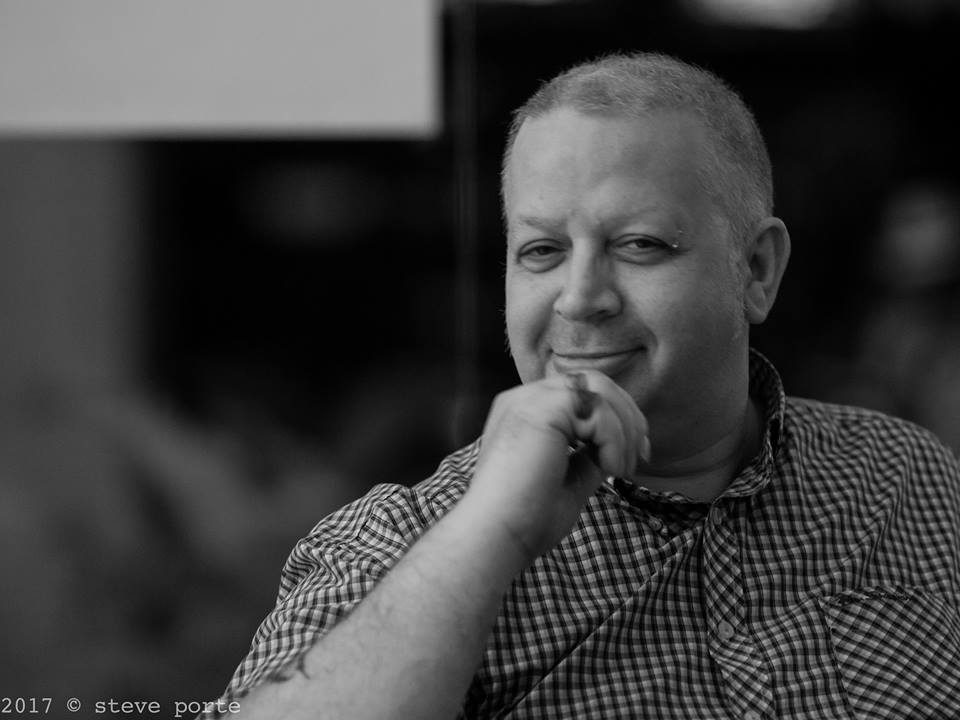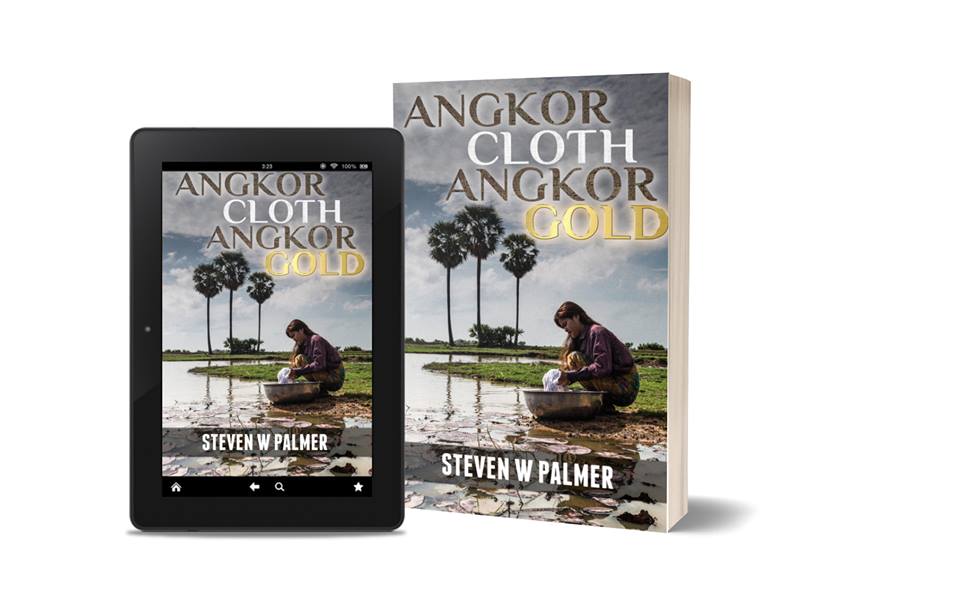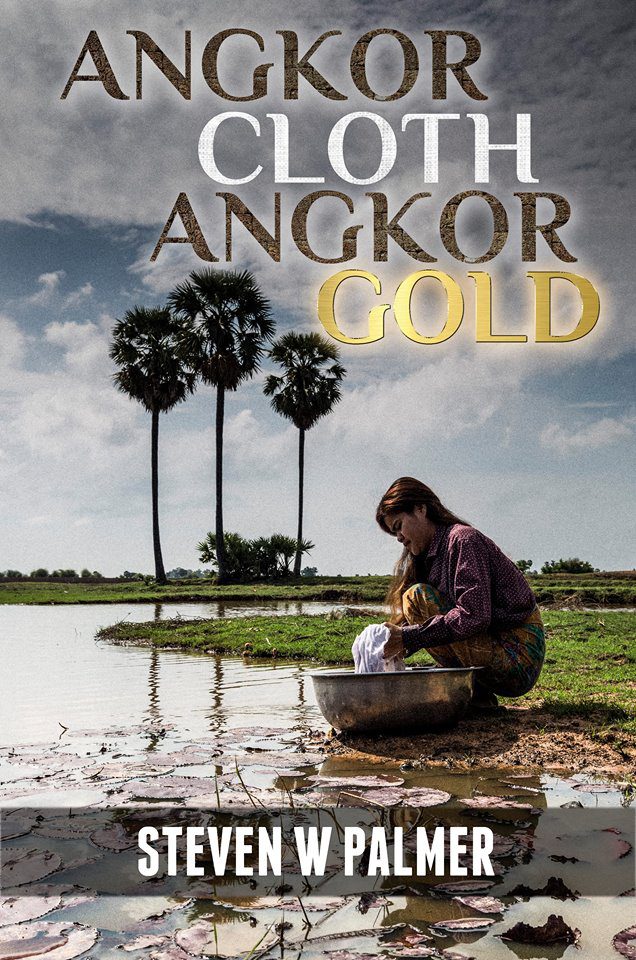CNE: Steven, could you give a brief introduction to your background and how you ended up writing from and about Cambodia?
Ah, the old favourite. A very varied career back in the UK, which has included work in the drugs and criminal justice fields for local government, as well as a spell as a sales and marketing director in real estate, and a lot of DJ’ing, much of which I’ve forgotten.
I made the decision to come back to Asia after my mum died at the end of 2011, and made the actual move in September 2012. I was living in Bangkok at first but found that I was getting a plane somewhere else nearly every weekend as the city was just too claustrophobic. I visited friends in Sihanoukville one week and fell in love with the place (pre the invasion of course) and decided it was the perfect place to finish my first novel, Electric Irn Bru Acid Test, as Bangkok – and trips to other places – provided too many…’distractions’.
I was in Sihanoukville for just over a year, then moved up to Phnom Penh for work. I was then in the capital for 3.5 years before moving to Kampot in mid-2017.
As far as my fiction writing is concerned, it wasn’t until I had written (or rewritten and released to be exact) my novella, Turning The Tables, (in about 2007) that I began to have any real confidence to do more writing. I’ve always been a huge fan of crime/noir/thrillers, and with so much raw material in Cambodia, it seemed a natural progression to choose my favourite genre(s) and base the stories here. So once Irn Bru was finished, that was the logical next step.
CNE: Why do you choose to write under a pseudonym?
Because I have written non-fiction pieces for many years, including good old photocopied fanzines back in the 80s and early 90s, and because I wanted to pursue book editing as well, it seemed a good idea to have a clear demarcation between that writing and my fiction work. Later, I was writing articles for The Advisor, then went on to be writer/editor for the Khmer Times’ weekly magazine, and then from that managing editor and main writer for a car magazine and a banking magazine. I also run and write the Keep It Kampot magazine, which will be expanding to a Phnom Penh version later this year. So I write non-fiction and do editing work as Iain Donnelly, and write fiction as Steven W. Palmer.

CNE: You write in the genre that has become known as Cambodia noir, how do you feel about that label?
Ambivalent at times. It’s become a sort of ‘catch-all’ label that has moved away from the original definitions of noir. But I am a huge fan of original noir (Dashiell Hammett was my introduction to noir and one of my literary ‘heroes’). When I put together Mekong Shadows, it was originally going to be a noir collection, but as submissions and competition entries came in, I saw it would be much more than that. But the whole Asian/Cambodian noir label is a useful umbrella to be under, and I’m very proud to be included with some highly talented writers who I admire. I more think of my books as thrillers with a noir element. Though the next book is more a dystopian noir set in the near future. It’s my homage to Hammett and will have lots of little Easter eggs for people to spot.
Being a Scot, therefore from a country with a long tradition of crime fiction author, which are you favourites?
To truly appreciate tartan noir, you have to read William McIlvanney. He really started the whole genre off in Scotland and his Jack Laidlaw series is the benchmark any Scottish crime writer has to set themselves against. But, of course, the most famous Scottish detective was on TV; Taggart and his immortal ‘catchphrase’ of “There’s been a murdur” (sic). And we can’t talk about crime fiction from Scotland without a huge mention and doff of the cap to Rankin’s Rebus. The perfect/imperfect anti-hero with all those ingrained faults that make the reader hesitant to sympathise with him.
I can’t see Rebus ever making it to Kampot, certainly not as a detective, but he could possibly be found propping up a bar somewhere and listening to The Stones or Zappa (Music plays a big part in the background of the Rebus books, and is basically an expression of what Rankin himself listens to). Rankin and Rebus are both big inspirations to me, and I do have a crime series set in 1950s Glasgow sketched out, which may make an appearance around 2025 at the current rate of writing!
Perhaps less well known by many, I need to give Denise Mina some credit as the leading female writer in the genre (or is that sub-genre?). I have met her a few times and she has some very clever insights into the world of criminal justice.
Though not crime fiction, I also have to mention Iain Banks, who is perhaps my favourite writer overall. His dexterity with the written word was simply without parallel in the last 40 years or so. He’s one of the few authors I reread as every time I do, I discover something else I hadn’t noticed before.
What about your local inspiration?
I wouldn’t say I get much inspiration locally as Kampot would more be a setting for cosy mysteries, and I prefer a little more bite to my stories. But from a Cambodia-wide perspective, there is never ending inspiration. Of course, the dark days of the Khmer Rouge and the 3 decades of chaos that came after that period has the potential to be the source of a thousand storylines or more, but there is also the people; the resilience, the friendliness, the courage, the occasional stubbornness. Let’s just say that quite a few real life people have contributed to my books so far.
How well do you research details, locations, names, cultural attitudes etc?
As much as I possibly can. For example, with Angkor Cloth, Angkor Gold, I could find very little information online regarding what life in the refugee camps was like. I was lucky enough to be introduced to two Cambodians who had been in the camps, one as an adult and the other as a child. That gave me some fantastic insight when it came to describing the camps in Thailand. For names, I cheat a little and create portmanteau names from newspapers and news sites. If I am writing about a location I have not visited, I try and research as much as I can find online, especially when it’s a historical setting. Google Street View can be an amazing research tool for locations, as it offers you the chance to get a ‘real’ feel of the place you are writing about. One thing I am still chasing is a high ranking policeman here to get a better feel for the (slowly improving) procedural and forensic side to investigations.
Phnom Penh and Cambodia as a whole has a far smaller expat population than say, Bangkok. Do you think focusing on a comparatively unknown location affects reader’s enjoyment, or puts them off reading you work?
I think a lot of people love fiction set in the region as a whole, whether because they have lived or travelled here, or simply because they like reading about exotic locales. Within the region the genres have almost been done to death, and with the exception of a handful of writers (James Newman, John Burdett, Christopher G. Moore, Thom Locke, and a few others) there is a lot of recycling and clichés in Thai-based crime fiction. So I think people are looking to books based in other countries such as Cambodia and Vietnam to see if they can experience something a little different.
Cambodia has the honour of having the most public holidays of any nation, how about your work ethic? Do you keep to a writing schedule, or do you follow a more laid back local approach?
If my approach was any more laidback, I would be completely horizontal. I have phases; I can go 2/3 weeks without writing a word, then will go through a creative spurt and knock out 10,000 words in a week. I think every writer is different; I know some who religiously set aside a couple of hours each day, others who will lock themselves away for an entire book, or those who just write when the feeling takes them.
You recently released your third book in the Chamreun trilogy. Are there any plans to write more (like a Douglas Adams trilogy), or will the mantle be handed over to a new character?
This is the last of the Chamreun books but he may make a guest appearance elsewhere. Angkor Cloth, Angkor Gold introduces a new character, Sophie Chang, who partners with Chamreun in the book. She is a 2nd Lieutenant in the Cambodian Police, but she grew up and was educated in the USA and has moved to Cambodia with her parents. She was part of Boston’s Bureau of Investigative Services Homicide Division, so brings experience and knowledge not always found here. Then, of course, despite that experience she is going to face the gender disparity within the force here, so is going to have some interesting adventures ahead. The first book featuring her, tentatively titled Apsara Dreams, will be out either late 2019 or early 2020.

Roughly how long does it take to write a book and publish? Do the ideas float around your head for a long time before coming together, or do you follow a set piece writing formula?
I have a book, the ‘ideas book’, with multiple ideas, characters, storylines etc. scribbled down. Some of them may never see the light of day. But once I have a story in place, I sketch out the timeline and the major characters, then start writing. How long it takes can vary – anywhere from 6 to 12 months to write – then beta readers, then editing and proofreading
How well do the writers in Kampot collaborate? Do you socialize together, is there any professional rivalry?
There aren’t that many of us now, but we don’t really collaborate or socialise, unless the latter is accidental. No rivalry either though, we all just do our own thing.
What’s next for Steven Palmer, will Cambodia be home for good, or are there plans to find new ideas in new places?
Who knows? For now, I am more than happy here, so unless something dramatically changes then I am here for the foreseeable future.
Angkor Cloth, Angkor Gold is currently available as an E-book and through ‘print on demand through Amazon.

